How the Cal Anderson sweep went down — and why it's so contentious
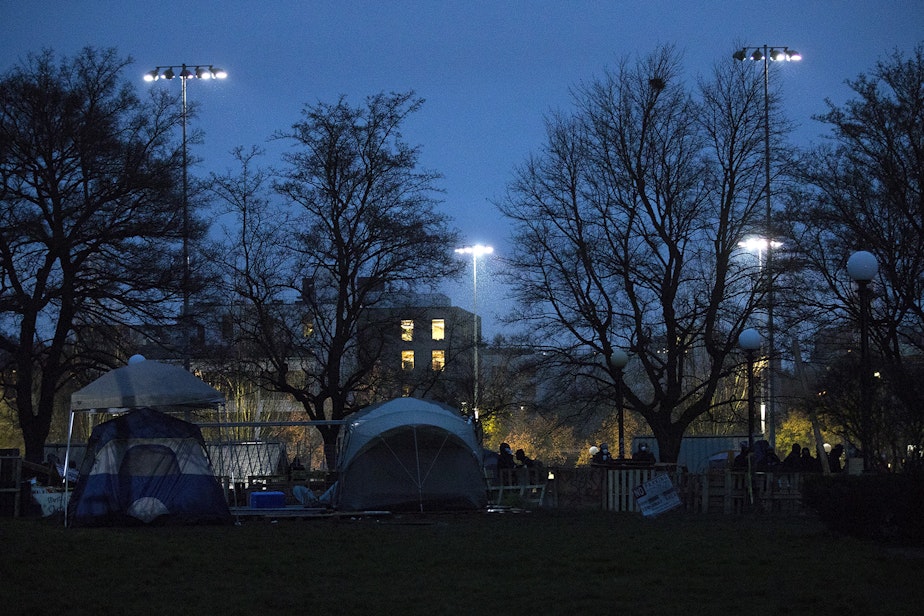
The warning notices went up around Cal Anderson Park last Monday: A sweep was coming.
When word got out, hundreds of protesters descended on the park. Before the pandemic, sweeps were part of unhoused life in Seattle – the city came in with outreach services, then cleared them out.
But this sweep on Capitol Hill stuck out: Kick people out of their tents one week before Christmas, in the middle of a pandemic? Even the Centers for Disease Control and Prevention recommended that people not be displaced and moved between shelters right now.
The optics were dramatic, with police descending on the camp in riot gear early on a cold December morning, but the reality was more complicated: Parks workers had been harassed and pelted with eggs by protesters, and hadn’t felt safe entering Cal Anderson for some time. Cars had been set fire, and neighbors were frustrated and scared at dark.
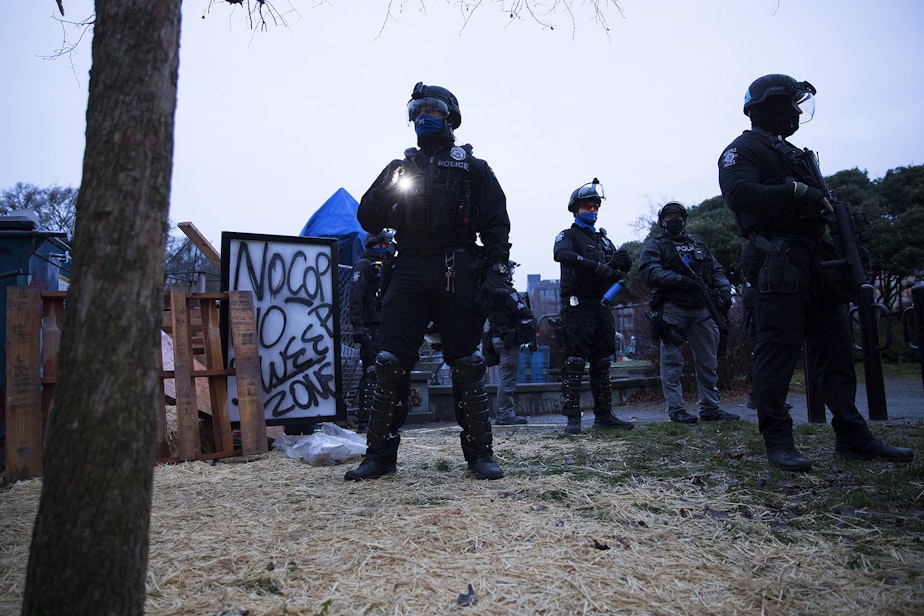
The city, in an attempt to move out campers in the crosshairs between antifascist protesters and police, had sent outreach workers three weeks earlier, to remarkable success: Of roughly 60 campers, 51 would move into a motel or tiny house village. Eight would decide to find another place on Capitol Hill to camp.
The Cal Anderson encampment was different from the other pop-up encampments in the city. For some, including activists who’d taken up residence in the park, it was a symbol of ongoing strife between protesters and police, and between factions in city hall over how to handle tent communities. For others who were living unsheltered, this was simply home for now.
When the protesters arrived last week, ahead of the scheduled sweep, they constructed a large barrier around the tent encampment. Made of chain link fence, wood pallets, and old furniture, some protesters said the fence was partly to keep police out and partly a big cleanup for the city.
By Wednesday morning when the sweep was scheduled, most of the camp residents had left Cal Anderson. About a dozen remained.
At 7:30 a.m., the campers were outnumbered by a large crowd of protesters ready to defend the camp from police.
But police never moved in, instead circling the park with lights flashing and blaring rooster sounds. Some people inside the encampment declared it a victory. Others said they were worried what might happen next. For two days the camp waited behind their wall.
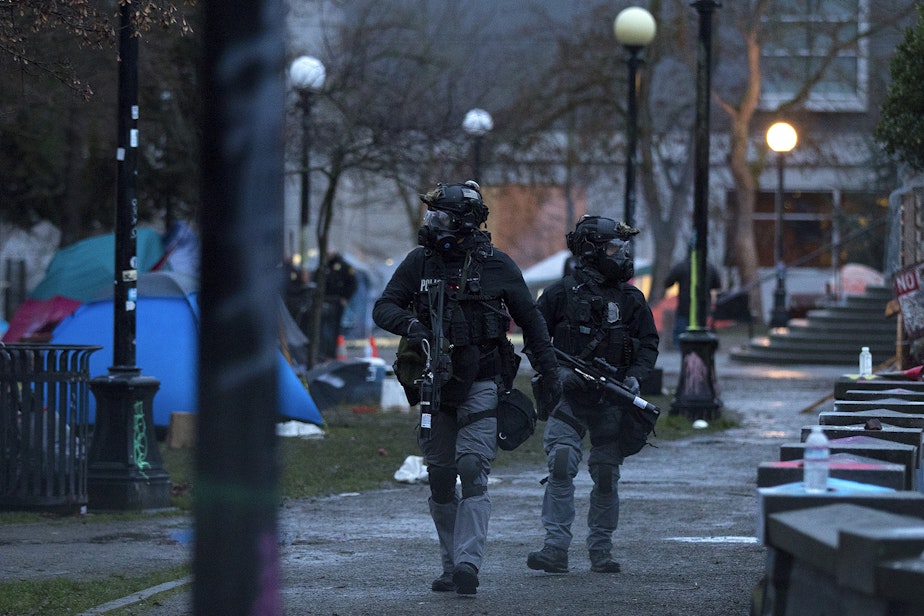
Then on Friday, before dawn and in the rain, shouts erupted from the park. In the dark, protesters spaced themselves out along the wall, yelling at each other to get ready. A little after 7:30 a.m., blinding spotlights flooded the area from all sides.
Police had surrounded the camp.
“The area clearly became a demonstration through the week and was approached as such, not a homeless encampment,” city spokesperson Will Lemke said by text message.
Two helicopters circled close overhead. A Seattle police sergeant’s voice boomed in an echo over the park through a PA system, telling people they have two options: Leave or be arrested. The sergeant told residents they could have their personal belongings stored by the city for up to 70 days.
After several warnings on the PA system, police moved in.
Immediately violence erupted. Protesters threw rocks at police who responded with flash bang grenades and rubber pepper bullets. The fence they’d built earlier in the week was quickly breached, and police swarmed in, chasing protesters out.
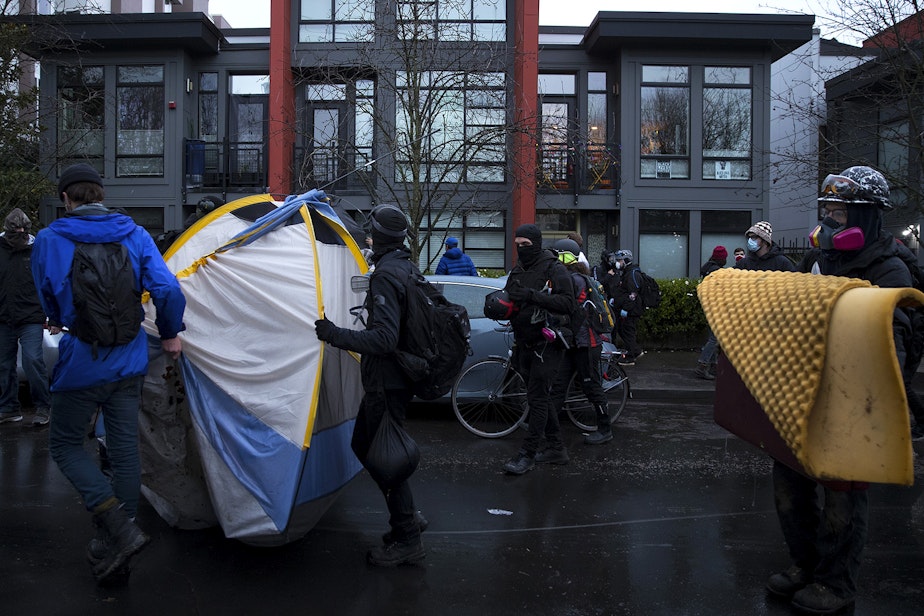
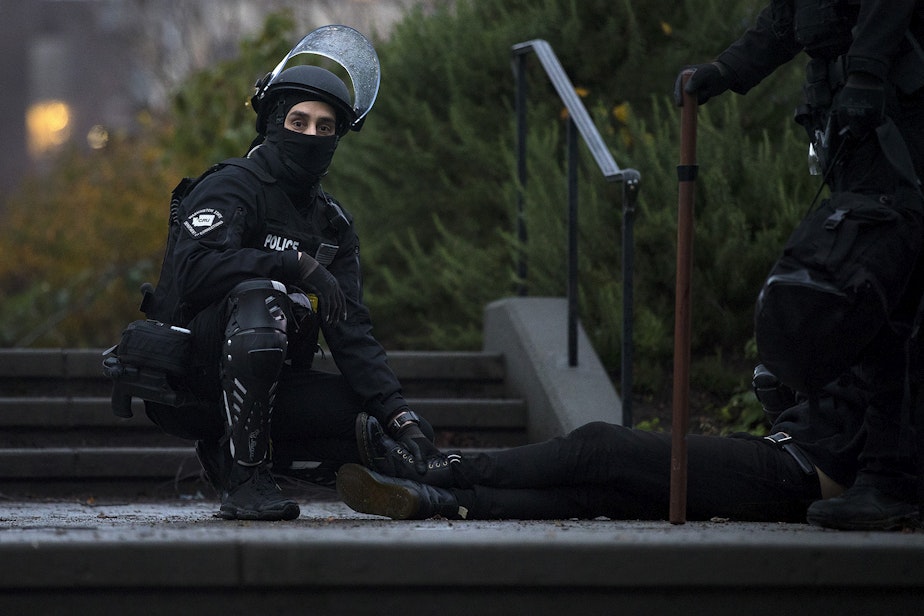
Even more police arrive. An armored bearcat truck – a tank – rolled down the hill and parked in an intersection with an officer sticking out the top holding a rifle.
Dozens of police on bikes moved in, their screeching brakes echoing off the buildings.
The campers in Cal Anderson awoke in a panic and started grabbing their few possessions. This isn’t the first time they’ve been displaced by Seattle Police, but the scene had never been so violent.
Caught between protesters and police, the campers found themselves between two groups that have had some form of this same clash for months. Since this spring, interactions between antifascist protesters and law enforcement have remained tense.
While most protesters are peaceful and unarmed at demonstrations, there have been multiple incidents of fireworks and frozen water bottles thrown at police. Police have responded with pepper spray and rubber bullets, and on a few occasions, tear gas, to disperse the crowds.
During this sweep, the campers of Cal Anderson Park were caught in this crossfire.
Anthony Pfeffer, who lived in the park since March, said he appreciated the support of the protesters and hoped it would continue after the camp sweep. The protesters brought with them supplies and food, Pfeffer said. Those kinds of things are needed all the time, he said.
Pfeffer and others in the camp have been displaced by the city before. Some are on waiting lists to join tiny house villages or get into an apartment. Pfeffer said he was worried about going to a shelter out of fear of the coronavirus. Plus, he felt safe in Cal Anderson Park and liked his community of support.
The former residents of Cal Anderson are also stuck in the middle of another fight: one at City Hall and Mayor Jenny Durkan’s office where there is a bigger question about encampment sweeps in general: Should they be happening at all? The city had great success moving people at Cal Anderson to better housing, but that isn’t always the case during other sweeps, when there aren’t enough spots available for number of campers being displaced. But it’s thorny, because the neighbors complain, the garbage piles up, people need help — so how should the city respond?
This summer a group of Capitol Hill businesses sued the city of Seattle for its handling of the CHOP protests. In October, several business and neighborhood groups sent a letter to the city with concerns about “a spiraling public health and public safety crisis” and this and other park encampments.
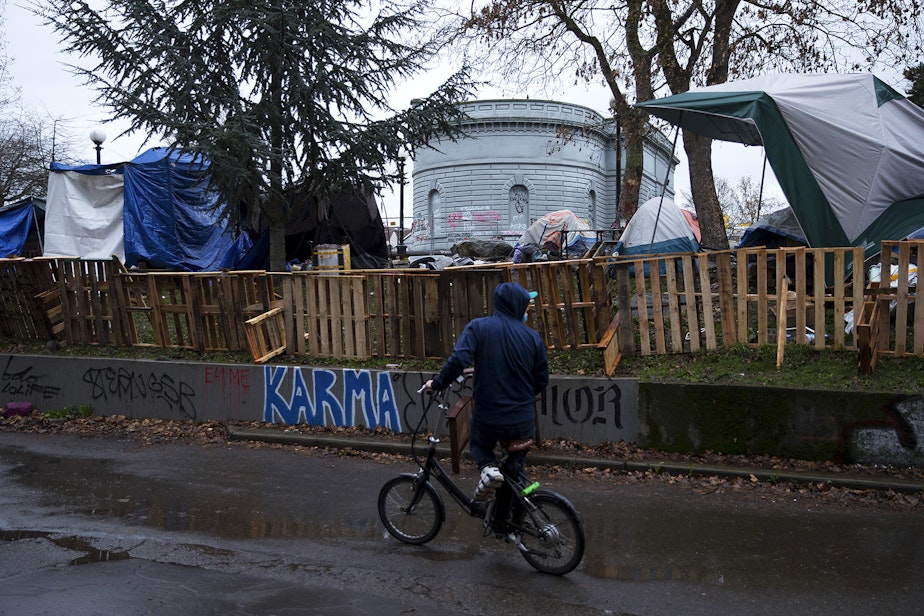
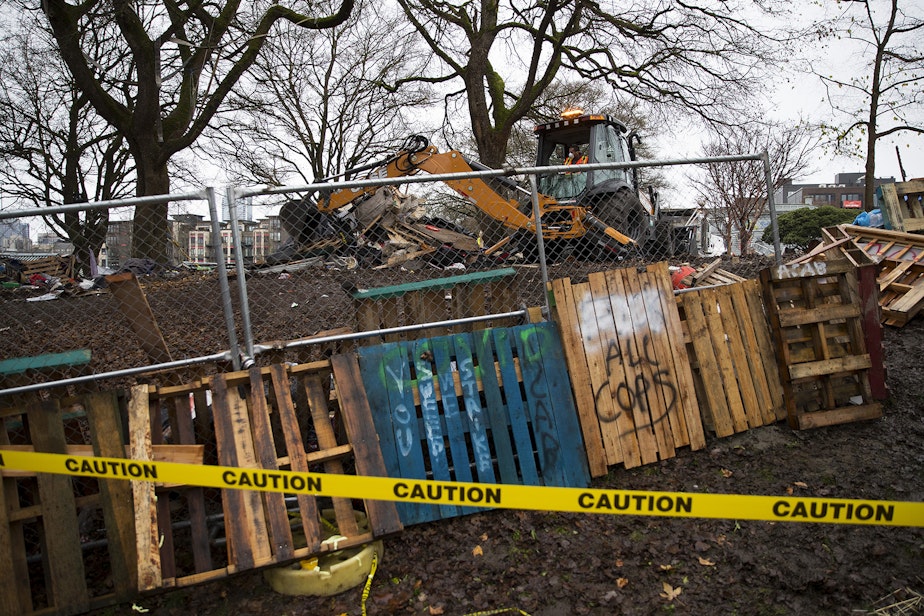
By Friday afternoon, the former tent encampment at Cal Anderson was completely vacated and closed off with police tape.
The few remaining tents that were once homes were scooped up and thrown away with everything else in the camp. Police said they arrested over 20 people in the process. Dozens of others were displaced and sent looking for shelter in the middle of a pandemic.
Some key leadership in the city will change hands to a new mayor and police chief. Like the remaining campers sent into the rainy streets Friday, it is far from certain where we go from here.




